Director and FacultyAn Online NEH Summer Seminar, July 12-30, 2021 for K-12 Teachers
Director and Faculty
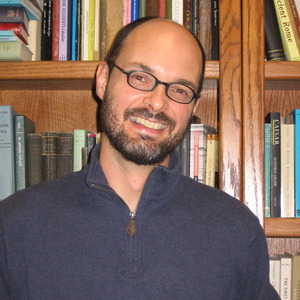 Matthew Panciera, Gustavus Adolphus College
Matthew Panciera, Gustavus Adolphus College
Matt has taught all levels of Latin and Greek, as well as courses in ancient history, mythology, and classical art and archaeology, since arriving at Gustavus Adolphus College in 2002. His research focuses on various aspects of Roman daily life, especially as we see it reflected in the graffiti of Pompeii. Recently he has become more interested in the pre-collegiate teaching of Latin and classics. He has taught at the Intercollegiate Center for Classics in Rome twice (1997-1998, 2015-2016) and in Catania (2008-2009) and has taken students abroad on numerous other occasions. In the summer of 2014 he co-organized at Gustavus the first ever Tusculanum Minnesotense, a week long spoken Latin seminar for a total of 16 professors and pre-collegiate teachers of Latin. In the spring of 2014 he received the Edgar M. Carlson Award for Distinguished Teaching, the highest honor granted to a member of the Gustavus faculty. He also currently serves as the Director of the Kendall Center for Engaged Learning.
Visiting Faculty and K-12 Consultant
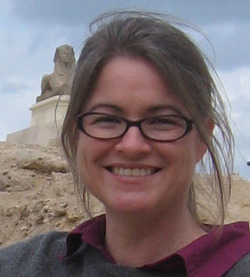 Beth Severy-Hoven, Macalester College
Beth Severy-Hoven, Macalester College
Beth has taught Latin, Greek, Roman history and archaeology in the Classics Department at Macalester College for almost twenty years. Her recent book, The Satyrica of Petronius: An Intermediate Reader with Commentary and Guided Review, won the first Bolchazy Pedagogy Book Prize of the Classical Association of the Middle West and South in 2015. She loves teaching Petronius' crazy Neronian period text for the window it provides students into the rich cultural life of Italy in the first century CE, from sex and slavery to satire and rhetoric. Professor Severy-Hoven has also taught seminars on the archaeological site of Pompeii and published feminist analysis of its wall paintings. From 2014-2015, she served as the Professor-in-Charge at the Intercollegiate Center for Classical Studies in Rome. The chance to bringing amazing literary texts into conversation with material culture are what drew her to the field of Classics in the first place, and she looks forward to sharing this challenge with colleagues this summer.
Jeremy Hartnett, Wabash College
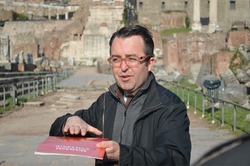 Jeremy has taught at Wabash College, his alma mater, since 2004, and is currently Full Professor as well as the Anne and Andrew T. Ford Chair in the Liberal Arts. Though Jeremy’s training is as an archaeologist, he teaches widely across the ancient world, a range encompassing Latin and Greek at multiple levels as well as history, civilization, and archaeology courses. Some of his favorite experiences as a teacher involve taking students to see the real stuff of antiquity in person, whether in museums stateside or in course-based trips to Italy that focus on Rome and the sites around the Bay of Naples. Recent trips have tackled Roman urbanism, Roman social history, Early Christianity in Rome, and “The Art of Empire.” He taught as Associate Professor at the Intercollegiate Center for Classical Studies in Rome (aka “The Centro”) in 2008-2009, has served on the Centro’s Managing Committee, and is currently serving as Professor-in-Charge for academic year 2017-18. Jeremy’s research uses material evidence to write social history, and he especially revels in deploying the evidence of Pompeii and Herculaneum to shed light on the daily life of the so-called inarticulate of history. His book The Roman Street: Urban Life and Society in Pompeii, Herculaneum, and Rome came out in 2017 from Cambridge University Press. It refills the “empty” spaces between buildings with the hustle and bustle of urbanites as they shopped for their essentials, scraped together a living, or preened for the multitude. In 2018, it won the John Henry Breasted Prize from the American Historical Association for the best book in English in any field of history prior to 1000 CE.
Jeremy has taught at Wabash College, his alma mater, since 2004, and is currently Full Professor as well as the Anne and Andrew T. Ford Chair in the Liberal Arts. Though Jeremy’s training is as an archaeologist, he teaches widely across the ancient world, a range encompassing Latin and Greek at multiple levels as well as history, civilization, and archaeology courses. Some of his favorite experiences as a teacher involve taking students to see the real stuff of antiquity in person, whether in museums stateside or in course-based trips to Italy that focus on Rome and the sites around the Bay of Naples. Recent trips have tackled Roman urbanism, Roman social history, Early Christianity in Rome, and “The Art of Empire.” He taught as Associate Professor at the Intercollegiate Center for Classical Studies in Rome (aka “The Centro”) in 2008-2009, has served on the Centro’s Managing Committee, and is currently serving as Professor-in-Charge for academic year 2017-18. Jeremy’s research uses material evidence to write social history, and he especially revels in deploying the evidence of Pompeii and Herculaneum to shed light on the daily life of the so-called inarticulate of history. His book The Roman Street: Urban Life and Society in Pompeii, Herculaneum, and Rome came out in 2017 from Cambridge University Press. It refills the “empty” spaces between buildings with the hustle and bustle of urbanites as they shopped for their essentials, scraped together a living, or preened for the multitude. In 2018, it won the John Henry Breasted Prize from the American Historical Association for the best book in English in any field of history prior to 1000 CE.
Rebecca Benefiel, Washington and Lee University
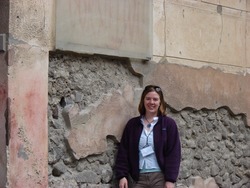 Rebecca is a leading expert on the graffiti of Pompeii and director of the Ancient Graffiti Project. In 2011 she won the State of Virginia Outstanding Faculty Award. Between her BA and PhD degrees, Rebecca studied at the University of Rome (L’Università di Roma, ‘La Sapienza’) and excavated in Pompeii with the Italian team in the House of the Wedding of Hercules. She has been returning to the Bay of Naples ever since, conducting research in Pompeii, working in the villas of Stabiae and the so-called villa of Poppaea at Oplontis (with the Restoring Ancient Stabiae team and The Oplontis Project), and surveying ancient wall-inscriptions in Herculaneum. Her current research focuses on writing within the Roman house. She is a proponent of digital Classics initiatives, leading the AGP (ancientgraffiti.org), and contributing to the Epigraphic Database Roma and EAGLE, an initiative to make cultural heritage more accessible. She is delighted to discuss with the NEH seminar the subject of epigraphy, the study of inscriptions and monuments, which provides such a fascinating window onto Roman culture and daily life. Where else can you learn which snippets of Roman poetry were most popular, how much cheese and bread cost, and how to pray to the gods? Her favorite graffiti are any that include the wish/greeting “feliciter” (happy times!).
Rebecca is a leading expert on the graffiti of Pompeii and director of the Ancient Graffiti Project. In 2011 she won the State of Virginia Outstanding Faculty Award. Between her BA and PhD degrees, Rebecca studied at the University of Rome (L’Università di Roma, ‘La Sapienza’) and excavated in Pompeii with the Italian team in the House of the Wedding of Hercules. She has been returning to the Bay of Naples ever since, conducting research in Pompeii, working in the villas of Stabiae and the so-called villa of Poppaea at Oplontis (with the Restoring Ancient Stabiae team and The Oplontis Project), and surveying ancient wall-inscriptions in Herculaneum. Her current research focuses on writing within the Roman house. She is a proponent of digital Classics initiatives, leading the AGP (ancientgraffiti.org), and contributing to the Epigraphic Database Roma and EAGLE, an initiative to make cultural heritage more accessible. She is delighted to discuss with the NEH seminar the subject of epigraphy, the study of inscriptions and monuments, which provides such a fascinating window onto Roman culture and daily life. Where else can you learn which snippets of Roman poetry were most popular, how much cheese and bread cost, and how to pray to the gods? Her favorite graffiti are any that include the wish/greeting “feliciter” (happy times!).
Ellen Sassenberg, Century High School (Rochester, MN)
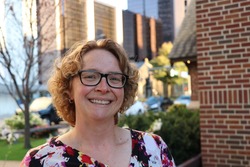 Ellen has taught Latin in grades 9-12 for the Rochester Public Schools since 1999. Beginning in 2002, she worked closely with the University of Minnesota’s Department of Classical and Near Eastern Studies to bring the College in the Schools program to the Rochester Public Schools. This concurrent enrollment program grants credit to students who successfully complete the University’s reading courses in intermediate Latin prose (Caesar’s de Bello Gallico) and intermediate Latin poetry (Vergil’s Aeneid). Ellen is also the recipient of the 2006 Excellence in Pre-Collegiate Teaching award from the Society of Classical Studies. Outside of school, Ellen’s hobbies include camping, skiing, trivia, and singing in choral ensembles.
Ellen has taught Latin in grades 9-12 for the Rochester Public Schools since 1999. Beginning in 2002, she worked closely with the University of Minnesota’s Department of Classical and Near Eastern Studies to bring the College in the Schools program to the Rochester Public Schools. This concurrent enrollment program grants credit to students who successfully complete the University’s reading courses in intermediate Latin prose (Caesar’s de Bello Gallico) and intermediate Latin poetry (Vergil’s Aeneid). Ellen is also the recipient of the 2006 Excellence in Pre-Collegiate Teaching award from the Society of Classical Studies. Outside of school, Ellen’s hobbies include camping, skiing, trivia, and singing in choral ensembles.